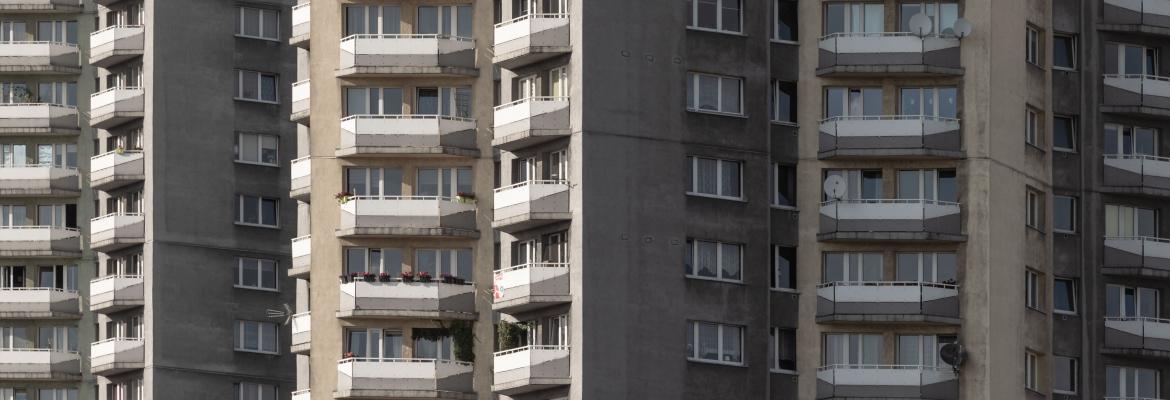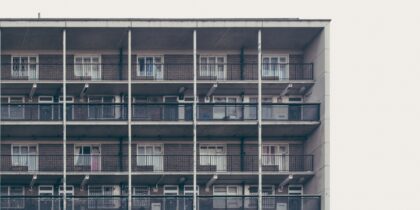By Mark Brown
Mental health difficulty is something that can significantly change the circumstances of your life. Time unwell reduces the chances you might have otherwise taken. A lifetime of mental health challenges means a person will often end up earning far less than their contemporaries. Experts argue about social drift theory, and whether poverty causes mental ill health or mental ill health causes poverty while people just try to get on with the reality of finding themselves poorer and more unwell and the toxic cycle between the two.
Scott, 24, lives in the north east of England. His last rented home wasn’t good for his mental health: “Basically, half the wall was green mould and wet to the touch. It was like as the mould got worse it was like my whole life and brain was rotting. It proper got in my head. This bloke came for a delivery and said ‘I wouldn’t let a dog live like this.’ I dunno if he was trying to be nice and caring about my situation but it made me feel worthless and embarrassed. Honestly it was shocking and it stunk. It wasn’t like that when I moved in. The housing people said I needed to put my heating on more but that costs.”
Basically, half the wall was green mould and wet to the touch. It was like as the mould got worse it was like my whole life and brain was rotting. It proper got in my head
In England, over half of the land is owned by less than 1 per cent of the population. Housing, and the land it is built upon, is expensive. According to the most recent annual Office of National Statistics English Housing Survey, of the estimated 23.2 million households in England in 2017-18, 14.8 million or 64 percent are owner occupiers, with 30 per cent of those currently paying off mortgages. While mortgage repayments are usually much less than payments in rent, obtaining a mortgage requires financial stability and savings. Experience of mental health difficulty often interrupts, limits or removes people’s options and abilities to work and accrue savings. Social housing is limited in availability in many places meaning people who experience mental health difficulties find themselves exposed to the private rental market in housing with the insecurity, potential for poor property management, poor living conditions and higher rents.
Scott says “The whole block wasn’t good. Just got treated like a place no one cares about for people no one cares about. It makes you feel bad, like you don’t deserve somewhere decent to live. When you come in you just want to chill and relax but you can’t. It affects how I feel about myself because it’s like ‘ah right is this all I’m fit for? Stuck where no one else would want to live?’”
According to the Office of National Statistics English Housing Survey, in 2017-18, 4.5 million households live in the private rented sector, which is 19% of all households. Of those 4.5 million households, about 1.4 million (31 per cent) were not satisfied with the terms of their tenure. On average, private renters spent a third of their household income, including Housing Benefit, on rent. In London this was 42 per cent of household income. Twenty per cent of private renters received Housing Benefit, with 85 percent saying Housing Benefit covered part of their rent. Sixty-three per cent of private renters, 2.8 million households, reported having no savings.
More than this, 25 per cent of homes lived in by private renters (1.1 million households) were non-decent according to the Decent Homes Standard, with at least 14 per cent (691,000 homes) having at least one Category 1 hazard – “serious and immediate risk to a person’s health and safety” – according to the Housing Health and Safety Rating System. Around 1.9 million private renters reported an issue with condensation, damp or mould in their home in 2017/18. Almost one fifth of privately rented homes (900,000) had serious disrepair in the same year.
Louise is 38 and lives in a council property in North Lanarkshire now. But when she lived in a third floor studio flat let by a private landlord, things were different. “It was a block at the end of a nice residential area and I had moved there because I wanted to live in the area to be closer to family,” she says. “When we went to see it the flat had been freshly painted and looked fine and it was affordable and they would rent to housing benefit tenants which most places wouldn’t.” Looks, however, were deceiving. In the eight months Louise lived there, it transpired that her landlord had just taken over the property and had no interest in maintaining it.
“The flat was so damp I used to get slugs climbing up my kitchen walls, mould forming on the walls,” Louise remembers. “Once the winter kicked in and it became apparent how poorly insulated the flat was it quickly became clear that the only way to keep the flat from becoming ridiculously damp was to run the heating almost continuously. Just running it for a few hours at night meant I was spending nearly £40 per week in electric. The heating was so poor I would have to spend most of the day wrapped up in bed just to stay warm. Because so much of my money was going on electricity to try and keep it even slightly warm I had no money to go out anywhere to get away from the damp and the cold. Physically this resulted in me getting repeated chest infections and me eventually being diagnosed with asthma.”
Once the winter kicked in and it became apparent how poorly insulated the flat was it quickly became clear that the only way to keep the flat from becoming ridiculously damp was to run the heating almost continuously. Just running it for a few hours at night meant I was spending nearly £40 per week in electric
A neighbour added to Louise’s challenges. “Home is where I rebuild from, it’s where I shore myself up and rebuild my defences,” she says. A new neighbour was drunk most nights, with lots of people in their flat and lots of loud music. A security door to the block was broken and never fixed. There were fights and arguments: “On more than one occasion someone kicked his door in looking for him, he would also occasionally wander the hallway and stairs of the flats banging on people’s doors screaming they couldn’t treat him like this. This culminated in my neighbour’s flat being set on fire one night. And the building having to be evacuated. As my flat was across the hall it was filled with smoke which marked all the walls and which the landlord did not repaint.”
When things started to deteriorate, Louise found herself stuck. “The quieter, more well behaved neighbours started moving out and the situation got worse. I had great difficulty sleeping which meant my depression progressively got worse to the extent I phoned the Samaritans on more than one occasion as I was at my wits end. My anxiety also got so bad because of all the disruption I started having panic attacks over noises in the close, when I would hear people visiting his flat I would start to get so anxious that it would often develop into a full blown panic attack. Unfortunately by this point my Personal Independence Payment had been stopped which meant I was living off my Employment Support Allowance and did not have the financial means to get another deposit and first month’s rent together.”
The quieter, more well behaved neighbours started moving out and the situation got worse. I had great difficulty sleeping which meant my depression progressively got worse to the extent I phoned the Samaritans on more than one occasion as I was at my wits end. My anxiety also got so bad because of all the disruption I started having panic attacks
The poor conditions and the stress took its toll on Louise: “I was lucky enough that my Community Psychiatric Nurse saw how bad my home situation was and wrote a report for the local council. I was on the housing waiting list. which resulted in me getting enough medical points to be offered a one bedroom flat.” It took Louise four months to be repaid her deposit.
In 2017/18, 68 percent of privately rented households had a named tenant or similar under the age of 45. The most prevalent household types were one-person households (25 percent) and couples with no children (24 percent). Twenty-three percent of private renters had a long-term illness or disability, lower than social renters (54 percent) or owner occupiers (31 percent). As the English Housing Survey remarks “This may reflect age, as private renters tend to be younger than owner occupiers and social renters, as well as eligibility for social rented accommodation, as those with a long-term illness and disability are more likely to be eligible for social housing.” Louise made that step into social housing, but what if that isn’t possible?
In 2017, over four million homes were rented from councils or housing associations. Of these, 1.6 million were council homes and 2.4 million were from housing associations. The security these provide are invaluable for those who live there, but this means few become available to people newly seeking them, such as those whose circumstances have changed.
Alex is 40, lives in Lancashire and has had problems with his mental health since his early teens, but it was five years ago when they “became unmanageable.” Alex has been renting his current home for ten years from a landlord who lives hundreds of miles away from him. “He knows nothing about my financial situation, and I live in constant fear of him finding out.”
“When you’re dependent on benefits,” says Alex, “you live in a state of constant paranoia anyway, a sense of being watched and sized up, and that feeling follows me into my home. I don’t feel safe anywhere. I’m pretty sure the only thing saving me is that he wouldn’t be able to get another tenant with the state the place is in.”
Insecurity dogs Alex. “Everywhere I look, something reminds me of the precariousness of my situation,” he says, “or points to some other difficulties I’m going to have to deal with further down the line. Damp is bringing up the flooring, so literally every step I take in here is a reminder. The flat feels like it’s falling apart around me. I’m terrified of losing my deposit. Not only that, but I’m permanently afraid that my landlord’s going to get tired of dealing with me and these issues.” His landlord expects him to pay for repairs out of his own pocket and then be reimbursed. Alex has sometimes had repairs made without telling the landlord. “Several times he’s accused me of trying to rip him off,” says Alex, “or of not telling him about important things. I never really know where I stand with him, or have a clue what he might do or say next. I can go months and months without being bothered by him. But then he’ll text me out of the blue, to ask me questions I’ve already answered several times, or discuss something about the tenancy, and my stomach drops through the floor when I see his name on my phone.”
Currently there are a number of legal protections for private tenants, but they require action on the part of the tenant to initiate. Gambling on legal processes to get improvements can be too much of a risk where the stress and insecurity of doing so brings any dispute directly into your home. This can mean putting up with conditions or behaviour which should not pass; or to the worsening of mental ill health due to stress and worry.
I know it’s a cliché, but I do feel like the walls are closing in. It feels really claustrophobic in here, like the building itself means me harm. I go out and I have to deal with social anxieties, I stay in and I’m filled with dread about the future
Alex worries that finding another place to live will be next to impossible at the price he is currently paying in rent. “I desperately want to leave, but I know I’d struggle to find another tenancy because I’m not working. I’m in the process of applying for social housing, but where I am the average wait is about 18 months. Every day this place feels less and less like home. It’s just a contract I’m stuck in because I have no other options. I’m just waiting for that call or that text or letter that starts the clock on my being turfed out.”
Like Scott and Louise, Alex finds the interaction between his home and his mental health to be toxic. “I know it’s a cliché, but I do feel like the walls are closing in. It feels really claustrophobic in here, like the building itself means me harm. I go out and I have to deal with social anxieties, I stay in and I’m filled with dread about the future. There’s no let-up. I feel trapped here, but at the same time it’s only my landlord’s complete lack of interest that’s kept a roof over my head so far.”
Every day this place feels less and less like home. It’s just a contract I’m stuck in because I have no other options
Where you live is an intimate part of your life. It is literally where you live. The benefits of private renting like choice and flexibility are defined by the market, not directly by the needs of people looking for stability and comfort. If you don’t have the cash, your choices are significantly limited.
Says Alex: “People talk about insecure housing as if it’s a moral failing. Like living with your parents or sleeping on friends’ couches way into adulthood are assumed to be things you only do because you can’t get your shit together, and it feels like renting is in that same category in certain people’s minds, of things that are slightly sad when you’re past a certain age. Among some of my friends buying a house is synonymous with being a ‘proper grownup’.”
Housing, and the effects of the housing market in England, are an under-discussed area in mental health, or other areas of disability for that matter. There are few simple answers. As homelessness charity Crisis says: “In the past a large proportion of people at risk of homelessness would have had their housing need met by councils or housing associations. Today many single homeless people have no choice but to rent from a private landlord particularly in England.” When people with mental health difficulties are more likely to end up poorer, especially when single, the private rental sector can be a place of vicious insecurity, and one very far from what people need to be well and to flourish.
As Alex says: “If there was ever a time I could imagine one day owning the roof over my head, though, it felt like a very distant future. Now it feels about as likely as owning a private jet.”
Names have been changed by request
These pieces are part of our writer in residence programme, and are the writer’s personal views.







